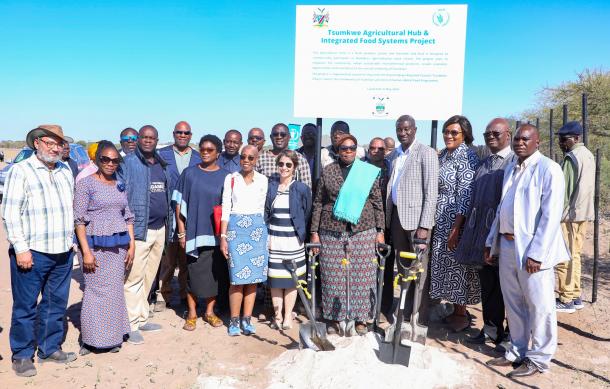
Vice President Netumbo Nandi-Ndaitwah advised residents of Tsumkwe to empower themselves through education and training in order for the Agriculture Hub and Integrated Food Systems Project to run efficiently.
Nandi-Ndaitwah was speaking at the groundbreaking ceremony of the project at Tsumkwe.
According to the Namibia Agronomy Board, Namibia has achieved a significant milestone in the agricultural sector by attaining a 55 percent self-sufficiency level in local vegetable production and a 45 percent level in crop production.
Vice President Netumbo Nandi-Ndaitwah says the Tsumkwe Agriculture Hub and Integrated Food Systems Project is a step towards Namibia becoming more food self-sufficient.
However, she says it is important for locals to be in charge of the project.
“I am appealing to the parents in this community. Please let us send our children to school; let us keep our children in schools, let us send our people to vocational training, let us keep our people in vocational training so that they can have the necessary skills to run and own this project. You should not allow this diamond to fall out of your hands.”
The Agriculture Hub and Integrated Food Systems Project will improve food security and nutrition while creating employment and contributing towards rural transformation.
The World Food Programme will provide the technical and financial support as part of an agreement signed with the Otjozondjupa Regional Council.
“For phase one of this project, through WFP Global Resources, we have raised N$6.6 million to go into the development of this phase. Heavy work has started on the drilling of boreholes; we are drilling three, and I am happy to say we have enough water to produce everything we need to produce here,” says WFP Country Representative and Country Director, Dr. George Fedha.
The Otjozondjupa Regional Council provided 65 hectares of land, which will have a fishpond producing fertilised water for the irrigation of the crops.
The Chairperson of Otjozondjupa Regional Council, Marlyn Mbakera, says, “By leveraging innovative agricultural technologies and mythologies, this hub will serve as a model for an integrated food system, fostering resilience and self-sufficiency in our community and ensuring that people have access to a nutritious and sufficient food supply.”
Lucerne and stable grain will be planted to reduce imports from other countries, while the project will also incorporate small-stock farming.





